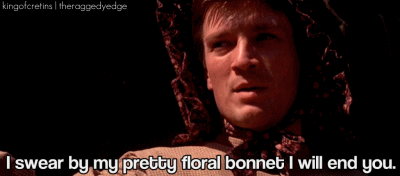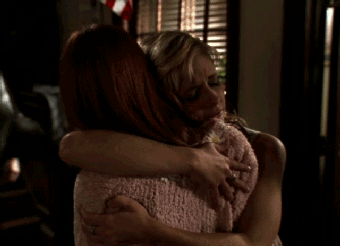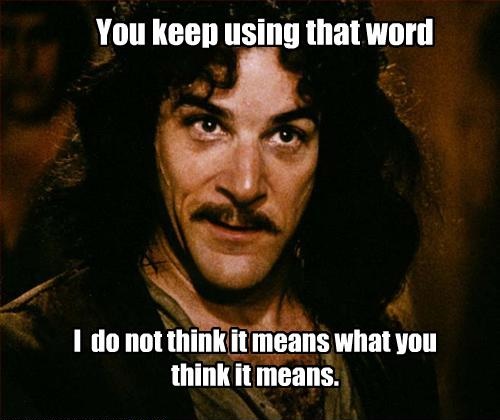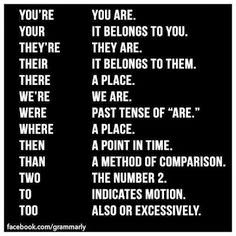So I've been in my little writer/editor cave for the past few months, working my little writer/editor butt off on various projects. The problem with that (besides neglecting this blog, which I clearly maintain with the sporadic manic-ness of a coke-addict), is that my poor husband gets neglected as well.
Quality time is at a premium, you know.
So, like many busy couples nowadays, we have to make the effort to spend time together. Our "thing", ever since we started dating, was to watch movies together, which then spread into shared television shows. And with the plethora--jeez, I've been hitting the thesaurus too hard--of media out there, we've found that we need to minimize our watching in order to maximize our time and enjoyment, if that makes sense.
Let me back up a bit so this makes more sense. I've never been much of a comic reader, but many of the movies he's dragged me to (the dragging was what happened initially; I went willingly after I realized I enjoyed them) were comic book movies, the Marvel ones in particular.
A couple of years ago, one of their movies was in production--a little picture called
Avengers, or
Avengers Assemble if you're over here in the land of tea and scones. You may have heard of it. Anyway, at the time, I kept reading online that some guy named
Joss Whedon was going to be writing and directing it. And amid everyone else's flailing and fangirling and fanboying, I was all, "Sooooo... I guess this guy's written some stuff before this, yeah?"
To which I'd get this reaction:
And then I'd be all, "What? What'd I say? Why do you all suddenly have pitchforks and other pointy objects?"
Because at that point, I'd never seen anything he'd done before. Yep. I was that person. You can stop hating me now, though, so put down the stabby things--I'm totally on the Joss Whedon bandwagon.
While the other Marvel movies were good, Avengers was, well, kind of in a class of its own. Even though he was juggling multiple characters who had (mostly) each had their own movies already, the writing was tight, the characterization was taken to another level, and it all just seemed to work. I can't even explain it. Maybe it was magic. I couldn't stop smiling for days after seeing that movie, so naturally we went and saw it again.

After that, I asked my husband if we could work our way through
Firefly. I'd tried to watch it before on a friend's recommendation--and I'd hated it. I have no idea why; just something about the first episode or two didn't resonate with me, so I gave up. But this time around I told myself that even if it wasn't my cup of tea, it was only on for, well,
less than a season (sorry for poking a sore spot,
Firefly super-fans), and I could suck it up and watch it all. We did, and I immediately wanted to set fire to Fox studios for cancelling it. *NOTE* For legal reasons, I feel I should say I was just speaking in metaphor--I'm not going to burn any television studios (or any building, for that matter) to the ground. It seems like a lot of work, for one, besides being highly illegal. **Edited Note** Unless there are spiders. Then all bets are off...
So we decided to tackle another of Joss Whedon's works, this time, the ultimate one, according to fans:
Buffy the Vampire Slayer. A quick note: Joss Whedon worked on the movie of the same name, but his script went through re-writes by other writers to make it more...well...what it was. The show isn't particularly related to it, if at all.
We're currently getting ready to start season 3 of Buffy, and consequently, season 1 of
Angel. We've been told by fans to watch these concurrently, because they aired back-to-back, so that's what we'll be doing. Also, my husband and I went to high school around the time Buffy aired--she and her friends were going through high school at nearly the same time we had, so there's this weird sense of nostalgia while watching the show. I'm pretty sure I owned most of Willow's sweaters.
Anyway, I suppose I should mention why I enjoy Joss Whedon's work, as opposed to just taking a whole blog post and fangirling to my little heart's content.
He "gets" characterization, for one. They're not all good or bad, not black or white, but delightfully flawed shades of gray. Loki, the main nemesis in
Avengers, has moments of real sympathy (and it's not
all because Tom Hiddleston is ridiculously hot) because of the writing. Captain "Mal" Reynolds of
Firefly, played by
Nathan Fillion, can be pretty heartless--as the captain of a ship that primarily smuggles goods and often deals with unsavory characters, he has to be--but he has so many redeeming qualities that the viewer sees him as a well-rounded person, not just a flat character. Buffy isn't just a ditzy blonde mess who simply stabs things that go bump in the night; she's a teenager with teenager problems and teenager concerns. One of my husband's favorite characters on Buffy is Cordelia Chase (played by
Charisma Carpenter). She's a vapid, rich, daddy's girl, but there's something endearing and oddly sincere about her, what she says, and how she interacts with the other characters. She's far from one dimensional--though she easily could have come across that way in the wrong hands--and is a valuable part of the show.
Dialogue is another of Whedon's strong points. All throughout his work (so far), I've noticed that the conversations between characters are snappy and real. Are people that clever in real life conversations? Some are--I've met some--but most aren't, and that's what makes Whedon's dialogue enjoyable to listen to. Upon watching Buffy, I can often hear in Xander Harris (Buffy's friend played by
Nicholas Brendon) some of Tony Stark's snarkiness that would later appear in
Avengers. Was Tony snarky in the
Iron Man movies before
Avengers? You betcha. But he was extra-cleverly snarky in
Avengers. My blog, my analysis. So there.

Because of Whedon's strong writing, the shows are
smart. There have been multiple times when we've been watching Buffy and something about the episode occurs to us that hasn't appeared to have caught the notice of the characters, and a few seconds later they acknowledge it. Example: On Buffy, Cordelia catches the eye of the new Watcher (the person in charge of research, training the Slayer, and keeping them informed), Wesley. They're clearly attracted to each other, though Wesley is probably in his twenties, and Cordelia is a high school senior. My husband turns to me and asks, "But she's eighteen, and he's not even a teacher there! There shouldn't be any problem with them even dating if they wanted to. What's the deal?" Literally a minute later while we're watching a scene at the prom, Giles, the school librarian and Buffy's previous Watcher, tells Wesley to just ask Cordelia to dance because she's eighteen, and he has the "emotional maturity of a blueberry scone." See, most shows just drag out drama like that for no reason, almost like the characters are too obtuse to realize that they're making things more difficult for themselves and each other. However, the viewer gets the sense that Whedon respects the viewer and their intelligence; that he believes we deserve better.
What's your favorite Whedon show or movie? Thoughts on what I've discussed above?
xoxo Sarah




